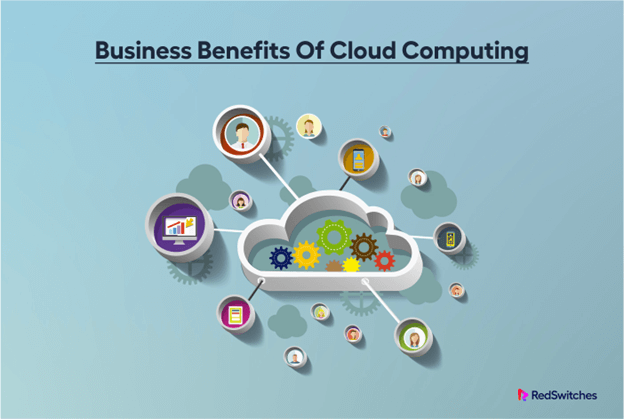Cloud computing has been one of the most transformational innovations in the last few decades. It has changed how businesses adopt digitalization for building (and rebuilding) their processes and offering excellent customer experiences.
As a result, more and more businesses of all sizes, scales, industries, and geographies are moving to the cloud. According to PwC’s 2023 Cloud Business Survey, close to 78% of executives said their company had adopted cloud for the whole or parts of their business operations.
This article is about the benefits of cloud computing and how cloud computing gives adopters a more significant edge over businesses that haven’t migrated to the cloud. We’ll also talk about the popular cloud computing models and how businesses can choose the one best suited to their needs.
Let’s start with the definitions.
Table Of Content
- What is Cloud Computing?
- What Are The Key Features of Cloud Computing?
- Why Does Your Business Need Cloud Computing?
- The Benefits Of Cloud Computing For Businesses
- What is a Cloud Deployment Model?
- What Are The Different Cloud Deployment Models?
- Conclusion
Cloud computing allows businesses to operate their processes how they want without investing too much time and resources into setting up and maintaining their IT infrastructure.
What Are The Key Features of Cloud Computing
As mentioned in the International Journal of Research and Analytical Reviews, cloud computing infrastructure has specific essential characteristics that allow it to be deployed efficiently and support business operations, regardless of the workloads. Here’re the most important characteristics:
On-Demand Self-Service
Businesses can opt for as many cloud resources as needed without paying for capacity that might go unused most of the time. In addition, the process of adding on-demand capacity is often automatic and done in minutes without requiring vendors’ participation or interaction.
Access From Anywhere
Businesses can access and use cloud resources from a variety of client platforms—these range from workstations to smartphones and virtual desktops. As a result, cloud computing services are platform-independent and fully portable.
Easy Scalability
The need for cloud services depends upon the workload and visitors. As such, businesses need cloud computing services that continue to deliver as the workload changes. This easy resource scalability is one of the most significant benefits of cloud computing.
Pay-As-You-Go Pricing Models
An essential feature of cloud computing is that consumers only pay for the services they use. Cloud computing services vendors charge based on the consumption of resources such as CPU cycles, network requests, and storage capacity.
Why Does Your Business Need Cloud Computing
The term ‘cloud computing’ is a relatively new term used since the 2000s. But this concept has been around since the 1960s when businesses used to rent time on mainframes rather than buying one for themselves.
Over time, the idea of cloud computing evolved into a set of services and products businesses can incorporate into their processes and see improvements in all areas.
Ultimately, the benefits of cloud computing are why businesses continue to adopt them. According to this Grand View Research, the cloud computing market was valued at USD 368.97 billion in 2021 and is expected to grow at a CAGR of 15.7 by 2030.
The Benefits Of Cloud Computing For Businesses
Here are some key benefits of cloud computing that businesses can expect, irrespective of the industry and scale:
Reduction in Business Costs
One of the most important benefits of cloud computing is a much-needed reduction in capital expenditures (CAPEX) and the cost of ownership of assets.
Businesses can rationalize their costs by not buying physical infrastructure, utilities, hardware, and software licenses, building data centers, and investing in other vital functions, such as marketing and R&D.
Ironclad Security
Loss of data, especially customer data, can happen because of attacks on business servers. These breaches can wreak havoc on a business’s goodwill and revenues.
Cloud computing service providers take security very seriously and implement multi-tier security measures for securing their infrastructure. These measures include automatic software updates, firewalls, granular access management, and single sign-on, to name a few.
Better Flexibility
One of the top business benefits of cloud computing is the extreme flexibility of these services. For instance, businesses can remove or add resources at the click of a button. This way, they can better predict the financial costs of cloud-based services.
Global Access With Minimum Restrictions
One of the top benefits of cloud computing for businesses is global access for all employees. This is ideal for remote teams that need a dependable platform to access through various devices, including tablets, smartphones, and laptops. Similarly, cloud-based services have no geographical boundaries, and the employees can access, store, recover, and process data from anywhere without needing specialized tools and infrastructure.
Insights into Data For Enhanced Competitive Edge
Cost-effective and connected data storage is an essential cloud-enabled service that businesses can use to store and analyze data. Many vendors offer services that work on massive data stores and discover valuable insights that enhance businesses’ competitive advantage.
Increased Collaboration
Since modern businesses are globally distributed with team members located worldwide, collaboration is essential for smooth operations. The collaborative aspects of cloud-based services and products are one of the more popular benefits of cloud computing for SMBs and enterprises. Employees can access essential data from all teams, discuss business problems, and implement solutions on distributed networks.
Tighter Quality Control
When businesses have access to centralized data and better-integrated operations, the quality of the overall business systems improves dramatically. As a result, there is better interaction, knowledge sharing, and adherence to compliances and workflow. In the long run, this adds to smoother-running business processes and operations.
Faster Disaster Recovery
Crisis cannot be foretold, especially when it comes to natural disasters, errors in software, hardware failure, or malicious intent. Whatever the cause, data loss means a significant negative impact on any business.
While these unforeseen circumstances cannot be avoided, businesses can be better prepared for such disasters. One way is to fully managed dedicated servers and data storage for quick disaster recovery. Then, if things go south, businesses can recover their data faster and resume normal operations sooner.
A managed bare-metal cloud helps businesses deal with system failures by keeping the servers up and running as virtual machines. Businesses get reliable and consistent access to their data thanks to automatic failover processes.
Investing in data recovery features is the best decision any business can make. Contact us today to learn more about how Red Switches manages bare-metal cloud solutions that offer excellent uptime for your business apps.
Long-term Sustainability
Cloud computing is greener and more sustainable for the planet. Since cloud-based data centers can service many businesses with a relatively small footprint, they are a great alternative to energy-hungry on-premises server banks.
Now that you have a clear idea of what cloud computing is and the benefits these services and products provide, it’s appropriate to discuss the various deployment models for these services.
What is a Cloud Deployment Model
A cloud deployment model defines the nature and purpose of the cloud depending upon several factors, such as:
- Size
- Access
- Ownership
What Are The Different Cloud Deployment Models
Popular cloud deployment models differ in how infrastructure is built and deployed. Here are the three most popular types of cloud deployment models:
Public Cloud
This cloud infrastructure is openly available to all users. The resources of a public cloud are shared among users. This restricts the volume of resources for individual users. Users generally don’t pay for maintenance of the public cloud.
Private Cloud
Private cloud infrastructure is not publicly available because an organization owns them. That’s why they’re known as internal clouds. Private cloud infrastructure is often dedicated to a small group of users who don’t have to share the resources with any external party. As a result, the private cloud offers enhanced security and better control over infrastructure components.
Community Cloud
Organizations that share business objectives and use the community cloud infrastructure for effective collaboration use this type of cloud infrastructure.
Hybrid Cloud
As the name suggests, this model combines private and public clouds. In this infrastructure setup, a business uses the public cloud and has an on-premise infrastructure for internal processes and data storage. This flexible setup results in better cost savings and security for internal data and processes.
Red Switches is a managed bare-metal hosting service provider that offers dedicated server hosting for your business. We offer dedicated managed servers with 24/7 monitoring and prompt customer service. Our bare metal servers provide secured data hosting facilities. Get in touch with us today to learn how we can help your business expand and increase profitability.
Conclusion
With so many hosting platforms available today, choosing the right solution for your business can be overwhelming.
This article covers the essential benefits of cloud computing services. Then it goes into the details of popular infrastructure choices so you can make an informed decision about your business operations.



